VSO have been worked in Tanzania since 1961, strengthening capacity to improve the quality, delivery and inclusive access to services in education, health and livelihoods.
All aspects of VSO’s programming are underpinned by social and gender inclusion, social accountability and resilience to ensure sustainable, systemic change in the lives of the most vulnerable and marginalised.
VSO Tanzania has operated in 20 regions including Mainland and Zanzibar. Our work is aligned to the priorities of the Government of Tanzania and the Sustainable Development Goals (SDGs).
As of December 2023, we've reached 6,751,306 people.
624 volunteers have contributed to our work.
Resilient livelihoods
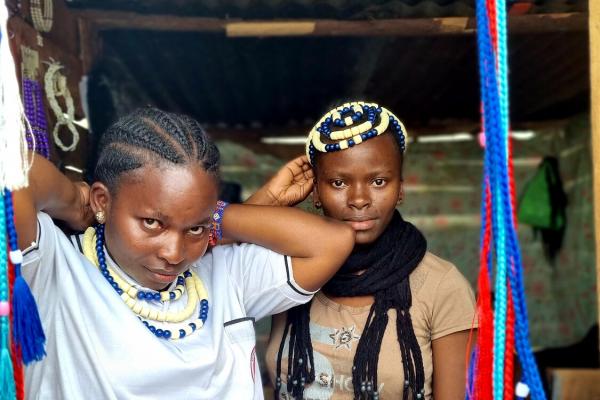
We're working to empower girls and young women to access new employment opportunities.
Our livelihoods programming focuses on empowering vulnerable and marginalized communities, including women, youth and people with disabilities to have enhanced capabilities, wellbeing and livelihood resilience.
Seven projects across 10 regions in mainland Tanzania as well as Zanzibar has been part of the program empowering a total of 800,546 marginalised people (56% female) with skills, knowledge and access to a range service that enable them to gain decent (self) employment and grow their businesses.
Futuremakers
October 2021 to December 2023
Funded by the Standard Charter Foundation, Futuremakers aims to support 500 young people to enhance their professional employability, vocational, and entrepreneurship skills.
The project also aims to strengthen existing community youth entrepreneurship platforms, improve access to business opportunities and improve disability inclusion in enterprises through policy influencing and improved employer perception.
Boosting the Blue Economy
January 2024 to December 2025
Our Boosting the Blue Economy project is promote skills development and employment that is environmentally focused, gender sensitive, market-led and demand-oriented.
Funded by Ranstad and the UK Foreign, Commonwealth and Development Office (FCDO), the project aims to equip 3,000 young people with necessary competences and knowledge to excel in the private sector through wage or self-employment, particularly in sectors such as fisheries, aquaculture and marine conservation.
Collective Action for Rights Realization in Extractive Industry (CLARITY)
January 2021 to December 2023 - Work being continued through the ACTIVE grant
The CLARITY project seeks to address the key challenges that exclude marginalszed women, people with disability and youth from equitably benefiting from the extractive sector, and cause environment degradation.
In the extractive industry, conflicts between investors and communities are common. Misunderstandings or limited knowledge of community needs and interests causes tension between communities and mining companies. Inadequate policy implementation perpetuates human rights abuses, child labour, corruption, social exclusion, gender pay gaps and environmental degradation, putting the local community at risk of losing land to private investors without compensation.
CLARITY is aiming to reach 4,000 people by engaging 800 community members and 160 community leaders to sustain inclusive and non-discriminatory environments and provide monitoring, reporting and accountability to the sector.
ACTIVE
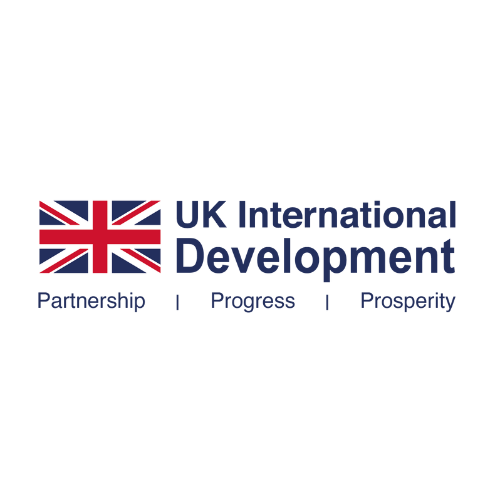
April 2022-2025
Funded by UK Aid from the FCDO, the ACTIVE programme is a five-year grant supporting the development of active citizenship across the Global South, aiming to reach 2.5 million people across 19 countries.
In Tanzania, the ACTIVE grant is supporting the work of the CLARITY project, addressing the key challenges that exclude marginalised women, youth, and people with disability from equitably benefiting from the extractive sector, securing alternative livelihoods options and ensuring environmental rights and corporate due diligence.
Learn more about the ACTIVE grant
Contact us
We work with a number of partners in Tanzania including the UK's Foreign, Commonwealth & Development Office (FCDO), Global Affairs Canada (GAC), Cuso International, Randstad, the Tanzanian Chamber of Commerce Industry and Agriculture (TCCIA), Small Industries Development Organisation (SIDO), and the Tanzanian Women Chamber of Commerce (TWCC).
If you are interested in supporting our work, or if you have another query, get in touch:
Address: Amverton Tower 4th Floor Unit A1, Plot #1127 Chole Road - Masaki, P.O.Box 6297 Dar Es Salaam. (Open Monday to Friday, 08:00 to 16:00 EAT)
Tel: +255 222 780 121
Email: tanzania.info@vsoint.org
Stories from Tanzania
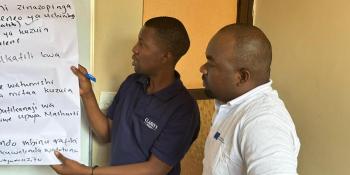
The sweet benefits of cross-cultural volunteering
Emeka Enwe, a Finish citizen, and Dotto Joseph from Tanzania might normally live over 4,000 miles apart from each other, but through VSO’s blended volunteering model, they’ve joined forces. Today they’re working together on a beekeeping project in Tanzania.
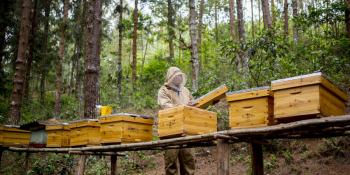
Beekeeping a sweet alternative to mining in Tanzania
Tanzania is a land rich in minerals, and mining is one of the country’s leading industrial sectors. However, the extractive industries cause many problems. But now there’s an economic alternative to mining through....bees! Read more
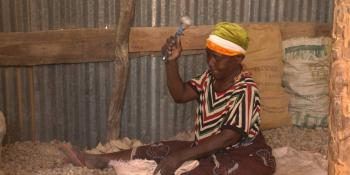
Helping women benefit in Tanzania’s male dominated mining industry
Women stand to gain much from Tanzania's male dominated mining industry. Find out how a VSO project is supporting women - and youth and people with disabilities - to access equitable opportunities in the sector in Geita and Mara.
Previous projects we've worked on
Health
Interactive theatre for justice
In Lindi, one of the regions with the highest rates of teen pregnancy in the country, teams of youth volunteers are using an innovative combination of drama and participatory learning to empower girls, and engage community gatekeepers on the issue.
Through interactive theatre and workshops, young people are empowered to tell their stories – including to those in positions of power - and advocate for change, while performances within communities help to raise awareness of risks and educate young people on healthy behaviours.
Livelihoods
Tanzania Local Enterprise Development (T-LED)
Funded by Global Affairs Canada, the T-LED project promoted sustainable economic growth, through the creation of 2,500 new jobs, and increasing the income of 1,300 SMEs.
This was done by improving people's knowledge of market opportunities and financing available, supporting women’s ability to develop their businesses and strengthening existing institutions to offer better, market-driven and gender-sensitive support to SMEs.
Encouraging grassroots growth in Tanzania
Lake Zone Youth Empowerment
In the Lake Zone region, we empowered marginalised young people – especially pregnant girls and young mothers – to develop the skills and confidence they need to secure sustainable livelihoods and challenge the gendered norms that prevent women becoming valued members of their community.
Through outreach programmes, apprenticeships and skills training, we’re supported 3,000 young people to succeed in the formal sector, whilst establishing 80 income generating groups to help entrepreneurs develop their own businesses.
Empowering Tanzanian girls and young mothers in the Lake Zone region
Education
Improving Children’s Learning and Participation in Kagera
This project was implemented within preschools and primary schools, working to empower all children to access high-quality education that allows them to reach their full potential.
We focused particularly on children living with disabilities, those in crisis situations, and hard-to-reach girls. We worked to develop teachers’ knowledge and skills in child-centred learning, improve school management, encourage community support for local schools, and developed comprehensive child protection and safeguarding systems.
We reached 17,271 children and education professionals across 48 schools in some of Tanzania’s most vulnerable communities. In the rural Kagera region, exam pass rates in our project schools rose from 78% to 96% in Standard IV and from 64% to 95% in Standard VII over three years.
Raise Income for Secondary Education (RISE)
In Tanzania, teachers can face an uphill struggle. Children often come to school hungry, and then large classroom sizes can make it difficult for teachers to engage students.
VSO's RISE project has gave more than 800 parents access to business loans, and helped nearly 600 parent farmers improve their crop yields by 50%.
In the classroom, the introduction of interactive teaching methods has improved attendance across eight schools, coupled with a 40% improvement in reading ability.
